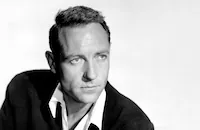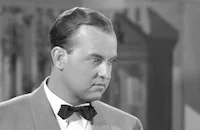Jumbo

Brief Synopsis
Cast & Crew
Charles Walters
Doris Day
Stephen Boyd
Jimmy Durante
Martha Raye
Dean Jagger
Film Details
Technical Specs

Synopsis
Around 1910, Pop Wonder's circus performs throughout the Middle West. Its major asset is Jumbo, a versatile performing elephant, and its major liability is Pop's uncanny ability to lose the week's receipts at local crap games. One day Pop's daughter, Kitty, hires Sam Rawlins, a jack-of-all-circus-trades, who proves to be both an excellent performer and an able tent hand. Unknown to all, however, is the fact that Sam is the son of John Noble, a circus entrepreneur who plans to get control of the Wonder Circus--and Jumbo--by buying up all of Pop's I.O.U.'s. Despite his growing love for Kitty, Sam reluctantly carries out his father's wishes and acquires the circus from Pop. Refusing to admit defeat, Pop, Kitty, and Lulu, Pop's fiancée of 14 years, become a touring carnival. They are eventually joined by Sam, who has broken with his father and persuades them that he is interested only in getting the Wonder Circus back in business. As proof of his sincerity, he has brought with him their beloved Jumbo. By pooling their talents and efforts, the four performers make the Wonder Circus "the biggest little show in the Middle West." Songs : "Over and Over Again" (Kitty), "Circus on Parade" (circus performers), "Why Can't I" (Kitty & Lulu), "This Can't Be Love" (Kitty), "The Most Beautiful Girl in the World" (Sam & Pop), "My Romance," "Little Girl Blue" (Kitty), "What Is a Circus" (Sam), "Sawdust, Spangles and Dreams" (Kitty, Sam, Pop & Lulu).

Director

Charles Walters
Cast

Doris Day

Stephen Boyd

Jimmy Durante

Martha Raye

Dean Jagger
Joseph Waring
Lynn Wood
Charles Watts
James Chandler

Robert Burton
Wilson Wood
Norman Leavitt

Grady Sutton
Sydney
Ron Henon
The Carlisles
The Pedrolas
The Wazzans
The Hannefords
Billy Barton
Corky Cristians
Victor Julian
Richard Berg
Joe Monahan
Miss Lani
Adolph Dubsky
Pat Anthony
Janos Prohaska
The Barbettes
Crew
Irving Aaronson
Preston Ames
Cleo Anton
Leo Arnaud
Alex Beaton
Busby Berkeley
Carl Bionde
Eric Carpenter
Michael J. Clark
William H. Daniels
George W. Davis
Al Dobritch
Beau Vanden Ecker
Roger Edens
Robert Ellsworth
Richard Farrell
David Friedman
A. Arnold Gillespie
Jane Gorton
Henry Grace
Sydney Guilaroff
Morton Haack
Charles K. Hagedon
Fenton Hamilton
Lorenz Hart
Robert R. Hoag
Hugh Hunt
Lloyd Isbell
Ralph Ives
J. Mcmillan Johnson
William Johnson
Al Lane
Elva Martien
Martin Melcher
Franklin Milton
Bob Murdock
Leonard Murphy
Tom Overton
Joe Pasternak
Joe Pasternak
Richard Rodgers
Carl Roup
Conrad Salinger
William Shanks
Sidney Sheldon
George Stoll
Robert Tucker
William Tuttle
James Utterback
Robert Van Eps
Mike Voss
Jack Wilson

Photo Collections
Videos
Movie Clip


Trailer
Hosted Intro
Film Details
Technical Specs

Award Nominations
Best Score
Articles
Billy Rose's Jumbo
In 1935, producer Billy Rose was already being publicized as the "Bantam Barnum" when he got the idea for Jumbo during a visit to Europe, where he saw two of the continent's famous indoor circuses. With a generous investment from John Hay Whitney, he brought together a team of showbiz experts: director George Abbott, dance director John Murray Anderson, songwriters Richard Rodgers and Lorenz Hart, and playwrights Ben Hecht and Charles MacArthur. They managed to coordinate over a dozen circus acts, more than 1,000 animals, the Paul Whiteman Orchestra and comic Jimmy Durante for an extravaganza about a romance between the son and daughter of rival circus managers. Though it ran for 233 performances, followed by a three-month engagement at the Texas State Fair, the show was too big to turn a profit.
Throughout Jumbo's original run, Rose was besieged with claims that the plot had been stolen from a variety of sources, though nobody could make enough of a case to get even a token settlement out of him. When he was negotiating the sale of film rights to MGM, however, Hecht, who was angry at Rose for re-writing his script at the last minute, told studio executives that he had, indeed, borrowed the plot from another play. As a result, MGM dropped its offer from $200,000 to $50,000. Desperate to break even on the show, Rose had to accept. Then the studio sat on the property for almost three decades.
Day, who worked mostly at Warner Brothers and Universal, had had several happy experiences working at MGM when she and her husband Melcher decided to make a big musical there, possibly to compensate for her having lost the lead in the film version of South Pacific to Mitzi Gaynor. Like Rose before them, they assembled a team of experts to bring Billy Rose's Jumbo to the screen. Director Charles Walters had started as a dancer and choreographer before turning to directing with Good News in 1947 and Easter Parade the following year. He and Day had teamed previously for Please Don't Eat the Daisies. Melcher's co-producer was Joe Pasternak, who had made Deanna Durbin a singing star at Universal in the '30s, before coming to MGM, where he worked with such performers as Judy Garland and Gene Kelly. In addition to producing Daisies for Day, he had also produced her biggest dramatic triumph, Love Me or Leave Me (1955). To keep the music up to MGM standards, they had associate producer Roger Edens, who had helped shape Garland's singing career and supervised the music on all of producer Arthur Freed's great musicals. And as second unit director in charge of the musical numbers, they got Busby Berkeley to come out of retirement for what would be his last film.
The original Jumbo had produced three hit songs: "The Most Beautiful Girl in the World," "Little Girl Blue" and "My Romance." To those and other songs from the original score, Day added another Rodgers and Hart standard, "This Can't Be Love." The numbers were filmed impeccably, with Berkeley staging an impressive array of circus stunts to accompany Day's first song, "Over and Over Again," and Walters making the camera dance with the performers as he had in his earlier films.
Although no singer, leading man Stephen Boyd had scored a hit as Messala, the villain in Ben-Hur, and did an impressive job lip-synching to James Joyce's vocals. But the film's cast was dominated by the presence of two seasoned comic performers. To play Day's father, Durante, who played the circus press agent on Broadway, returned to the screen after a ten-year absence. Although the role was different, he got to re-create his most famous line from the original. When he's stopped while trying to steal back the circus' trademark pachyderm and asked, "What are you doing with that elephant," Durante deadpans, "What elephant?"
To play Durante's lovelorn girlfriend, Martha Raye returned to the screen after a 15-year absence during which she had become a top television star. The circus routines gave Raye a chance to show off her still shapely legs, while she also shared a lyrical duet with Day that reminded fans she was one of the best singers in the business. Raye was so thrilled with the role that she re-located to the West Coast, hoping her part would lead to other film offers.
Unfortunately for all concerned, Billy Rose's Jumbo was far from a giant at the box office. MGM gave it a big buildup, complete with an opening engagement at the Radio City Music Hall, but fans and critics were unimpressed. Only Raye, Durante and the elephant got decent reviews. It took the Vietnam War and her tireless work for the USO to rejuvenate Raye's career. But it was Day who suffered the most from the film's box-office failure. She had been campaigning to star in the film versions of The Unsinkable Molly Brown and The Sound of Music, but lost both roles, to Debbie Reynolds and Julie Andrews respectively. The latter film marked a resurgence in popularity for the film musical, but it came three years too late to help Billy Rose's Jumbo at the box office.
Producer: Joe Pasternak, Martin Melcher
Director: Charles Walters
Screenplay: Sidney Sheldon
Based on a musical play by Ben Hecht and Charles MacArthur
Cinematography: William H. Daniels
Art Direction: George W. Davis, Preston Ames
Music: Richard Rodgers, George E. Stoll
Principal Cast: Doris Day (Kitty Wonder), Stephen Boyd (Sam Rawlins), Jimmy Durante (Pop Wonder), Martha Raye (Lulu), Dean Jagger (John Noble), Grady Sutton (Driver), Sydney the Elephant (Jumbo), Billy Barty (Joey).
C-124m. Letterboxed. Closed captioning.
by Frank Miller

Billy Rose's Jumbo
Quotes
Trivia
This musical marked the end of Busby Berkeley's movie career.
Notes
The film was also known as Billy Rose's Jumbo. According to various Hollywood Reporter news items from 1943 through 1945, M-G-M paid approximately $100,000 for the film rights to Billy Rose's Broadway hit Jumbo. The film version was to be produced by Arthur Freed, based on a script by Ben Hecht and Charles MacArthur, that was to "modernize" the story. Wallace Beery, Frank Morgan and Mickey Rooney were named as probable stars, along with Jimmy Durante, who would revive his role from the Broadway show. Composers Richard Rodgers and Lorenz Hart were, according to a November 12, 1943 Hollywood Reporter news item, hired to write "several new songs" at $7,500 per song for the new production. Roger Edens was named as the film's associate producer in May 1944, at which time it was announced that the film would be shot in Technicolor. Other news items in 1944 and 1945 indicated that Frank Sintra was to star in the film, with Kathryn Grayson as the female lead. In late 1945, Rouben Mamoulian was mentioned in a news item as the film's director.
Production plans were halted at the end of 1945, but plans were, apparently, revived in 1952, when Hollywood Reporter news items indicated that to Edens' first assignment as a producer was to be Jumbo, with Red Skelton, Donald O'Connor and Debbie Reynolds mentioned as cast members, and Paul Groesse considered for art director. According to an obituary for the trapeze artist Fay Alexander, he performed as a stunt double Doris Day in the film.

Miscellaneous Notes
Released in United States 1962
Released in United States on Video November 17, 1987
Released in United States 1962
Released in United States on Video November 17, 1987















